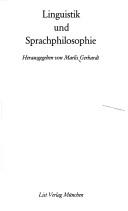| Listing 1 - 10 of 3086 | << page >> |
Sort by
|
Book
Year: 2001 Publisher: Cambridge ; New York, NY : Cambridge University Press,
Abstract | Keywords | Export | Availability | Bookmark
 Loading...
Loading...Choose an application
- Reference Manager
- EndNote
- RefWorks (Direct export to RefWorks)
Book
ISBN: 287009485X Year: 1996 Volume: *96 Publisher: Sprimont Mardaga
Abstract | Keywords | Export | Availability | Bookmark
 Loading...
Loading...Choose an application
- Reference Manager
- EndNote
- RefWorks (Direct export to RefWorks)
Book
ISBN: 203867129X 9782038671292 Year: 1998 Volume: 129 Publisher: Paris Larousse
Abstract | Keywords | Export | Availability | Bookmark
 Loading...
Loading...Choose an application
- Reference Manager
- EndNote
- RefWorks (Direct export to RefWorks)
Book
ISBN: 9782296075825 Year: 2008 Publisher: Paris Harmattan
Abstract | Keywords | Export | Availability | Bookmark
 Loading...
Loading...Choose an application
- Reference Manager
- EndNote
- RefWorks (Direct export to RefWorks)
Book
ISBN: 9780415999014 9780203879481 9781135838713 9781135838751 9781135838768 9780415850230 Year: 2009 Volume: 7 Publisher: New York, N.Y. Routledge
Abstract | Keywords | Export | Availability | Bookmark
 Loading...
Loading...Choose an application
- Reference Manager
- EndNote
- RefWorks (Direct export to RefWorks)
Book
ISBN: 9789048132874 9789048132881 9789048132911 9789400730977 Year: 2010 Publisher: Dordrecht Springer Netherlands
Abstract | Keywords | Export | Availability | Bookmark
 Loading...
Loading...Choose an application
- Reference Manager
- EndNote
- RefWorks (Direct export to RefWorks)
This book is intended as a preliminary work for a uniform description of language, especially overall organization and architecture of grammar and its connection with semantics. An array of general logical intuitions, concerning the initial requirements for building and interpreting compound expressions, stemming from Frege, Husserl and Ajdukiewicz, is spelled out to form a general framework, allowing for critical evaluation of today's leading paradigms, such as Generative Grammar, Montague Grammar or Type-Logical Grammar. The main message of the book is that categorial grammar is not only one of the competing theories of syntax, but - according to some general features - is the most plausible framework for logical syntax of natural language. With profound motivation the book proposes an original treatment of quantification and formulates insightful general principles of syntactic analysis.
Book
ISBN: 9782081270855 2081270854 Year: 2013 Volume: 1075 Publisher: [Paris] Flammarion
Abstract | Keywords | Export | Availability | Bookmark
 Loading...
Loading...Choose an application
- Reference Manager
- EndNote
- RefWorks (Direct export to RefWorks)
Réflexions sur la notion de concept appuyées sur des exemples empruntés à la vie quotidienne. Le philosophe redéfinit des concepts dans leur lien constitutif à la position de celui qui les pense.
Book
ISBN: 9780199645169 0199645167 Year: 2014 Publisher: Oxford Oxford University Press
Abstract | Keywords | Export | Availability | Bookmark
 Loading...
Loading...Choose an application
- Reference Manager
- EndNote
- RefWorks (Direct export to RefWorks)
Robert Stalnaker explores the notion of the context in which speech takes place, its role in the interpretation of what is said, and in the explanation of the dynamics of discourse. He distinguishes different notions of context, but the main focus is on the notion of context as common ground, where the common ground is an evolving body of background information that is presumed to be shared by the participants in a conversation. The common ground is the information that is presupposed by speakers and addressees, and a central concern of this book is with the notion of presupposition, and with the interaction of compositional structure with discourse dynamics in the explanation of presuppositional phenomena. Presupposed information includes background information both about the subject matter of a discourse and about the evolving discourse itself, and about the attitudes of the participants in the discourse, including who and where they are, and what they agree and disagree about. Stalnaker provides a way of representing self-locating information that helps to explain how it can be shared and communicated, and how it evolves over time. He discusses the semantic and pragmatics of conditionals and epistemic modals, and their role in representing agreement, disagreement, and the negotiation about how a context should evolve. The book concludes with a discussion of the relations between contextualism and semantic relativism.
Book
ISBN: 9780198732495 Year: 2015 Publisher: Oxford Oxford University Press
Abstract | Keywords | Export | Availability | Bookmark
 Loading...
Loading...Choose an application
- Reference Manager
- EndNote
- RefWorks (Direct export to RefWorks)

ISBN: 3471614273 9783471614273 Year: 1974 Volume: 1427 Publisher: München List
Abstract | Keywords | Export | Availability | Bookmark
 Loading...
Loading...Choose an application
- Reference Manager
- EndNote
- RefWorks (Direct export to RefWorks)
| Listing 1 - 10 of 3086 | << page >> |
Sort by
|

 Search
Search Feedback
Feedback About UniCat
About UniCat  Help
Help News
News